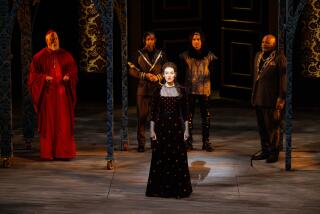MOVIE REVIEW : Dark, Savage Side Emerges in New ‘Henry V’ : Movies: Young British actor-director Kenneth Branagh’s skill and passion equal his daring in taking on Laurence Olivier’s 1944 triple feat.
- Share via
Heroism is something the movies have often cheapened; verbal poetry and rhetoric they often ignore altogether. Yet--seemingly on fire with all three--the young British actor-director Kenneth Branagh has brought them, in blazing measures, to his adaptation of William Shakespeare’s “Henry V” (opening at the Park Theatre in San Diego).
At first, it seems a madly audacious endeavor. Branagh--trying to match Laurence Olivier’s astonishing triple feat of adapting, directing and starring in a filmed “Henry”--butts heads with an inarguably great movie and the champion British classical actor of the century.
Yet, his skill and passion equal his daring. This thrilling new version of the play complements rather than challenges Olivier’s. If Olivier gave us the glint of sunlight on armor and the wind roaring through the pennants and flags, Branagh gives us the rot, the mold, the wounds and the crusted blood underneath.
Olivier, in a conceit dazzling in its wittiness and prettiness, staged “Henry” in a mock-up of the Globe Theater and sets skewed to the style of Renaissance Flemish or Dutch paintings. Branagh’s sets are the vast, empty castles of movie epics or horror shows, and his battlefields are plateaus of mud and gore under gray, bristling skies, where men die foully. If Olivier gave us the ultimate poet-warrior king, Branagh gives us a blunt but brave boy, a sawed-off, sandy-haired runt, passing through fire and chaos to manhood. This is a dark, savage “Henry”--post-Marx, post-Brecht, post-”Paths of Glory,” post-Vietnam--in which the heroism is undercut with bloodshed and in which the Chorus (Derek Jacobi) glides, at first, through a movie sound stage, all in black, his voice scarringly urbane.
Death is stripped of every scrap of nobility. Both sides, British and French, are equally full of heroism and cowardice, sadism and self-sacrifice.
In place of Olivier’s great showpiece scene--the equestrian French army charging jubilantly right to left in a burst of stallion exhilaration--Branagh gives us a “Chimes of Midnight”-like battle of stabbings and clouts in the mud, capped by a somber, dazzling Wellesian tracking shot on Henry, as he carries the corpse of Falstaff’s Boy across a somber, reeking wasteland of broken bodies. Branagh, only 28--about Henry’s age at Agincourt, and almost a decade younger than Olivier when he made his 1944 version--is a current Wunderkind of British theater. And his versatility in his only two movie parts, “High Season” and “A Month in the Country,” was shocking, as if the same actor could master roles meant for either Monty Python or Montgomery Clift.
In playing Henry V, he’s taking one of the great glamour roles in Shakespeare. Yet he deglamorizes it, ripening steadily through the forge of warfare until the burst of fiery rhetoric on his great “St. Crispin’s” speech.
“We few, we happy few, we band of brothers,” keens the erstwhile Prince Hal, his face shining in the gloom, to his mud-encrusted, outmanned army and, like Churchill’s surging wartime oratory during the Blitz, this speech makes the blood run hot, the sinews quiver. That’s the force of Branagh’s conception. Olivier, working in wartime to arouse national spirit, gave us a hero who surpassed understanding. Branagh roots his in the loam of common character.
The movie is about a different kind of heroism as well: the heroism of the theatrical ensemble. Paul Scofield is an uncharacteristically sage King Charles VI; Ian Holm a dour Fluellen; Robert Stephens a scabrous, cowardly thick Pistol; Charles Kay and Alec McCowen two magnificently conspiratorial church prelates; Emma Thompson a notably non-featherbrained Katherine (playing a deliciously wry courting scene with her husband, Branagh); Robbie Coltrane (in flashback scenes borrowed from the “Henry IV” plays) a sad, blubbery dying Falstaff, and Judi Dench a definitively funny Mistress Quickly.
The British won at Agincourt because of superior technology. The expert Welsh archers mowed the French cavalry down. But in Shakespeare’s world, they also won because of gorgeous poetry and heart-stirring eloquence. Branagh’s expertly cut and reshaped “Henry V” (Times-rated Mature for violence) gives us the grimy face of war, yet he also gives us the guts--and the soul and poetry that animate them both. Egoist and daring scamp Branagh may well be, but so, in ways, were Olivier and Welles. It’s a pleasure to welcome this young lion and his company’s splendid “Henry” to their ranks.
More to Read
Only good movies
Get the Indie Focus newsletter, Mark Olsen's weekly guide to the world of cinema.
You may occasionally receive promotional content from the Los Angeles Times.










